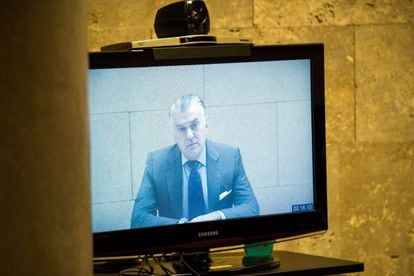Ex-PP treasurer tells court he paid secretary general cash bonus in person
María Dolores de Cospedal emphatically denies allegations of Bárcenas


Luis Bárcenas, the former treasurer of the ruling conservative Popular Party (PP), on Friday reiterated in court that he had given 7,500 euros in 500-euro notes as a bonus to the PP’s secretary general, María Dolores de Cospedal, who in turn empathically denied his claims.
“It was my hand that gave the envelope to Mrs Cospedal,” Bárcenas said via videoconference from the Soto del Real jail in the outskirts of Madrid, where he is in preventive custody while awaiting possible charges of fraud and money laundering.
De Cospedal, who claims the former treasurer has infringed her right to honor, has brought a civil case against Bárcenas. “When you hand over black [undeclared] money, normally there aren’t any witnesses,” the former PP moneyman added.
Bárcenas noted down the cash bonus payments he claims he made to De Cospedal and other PP leaders, including Prime Minister Mariano Rajoy, as well as illegal donations to the party in secret ledgers, which were first revealed by EL PAÍS on January 31 of this year. He told the court that he handed over the cash sums in question at the PP’s headquarters in the center of Madrid and in his office at the Senate.

“I did not receive the sums indicated in the papers [revealed by El PAÍS], nor the others to which the accused has referred,” De Cospedal told the court. “He has made false accusations, and very demonstrably so.”
When later asked about whether other PP leaders had received cash bonus payments, the secretary general of the PP replied: “I don’t know if others received bonuses; when I asked them they told me they hadn’t.”
Bárcenas and De Cospedal were also at odds about the timing and nature of Bárcenas’ departure as PP treasurer and as a member of the Senate.
“I wasn’t sacked; I left of my own accord,” Bárcenas said. “Cospedal asked me to formally leave the post but to carry on with my duties. I told her that if [Prime Minister] Rajoy wanted me to do so, I would leave immediately, and I carried on working as treasurer until March 2010. I took the decision to leave and after that gave up my seat in the Senate. My personal situation changed then.”
Bárcenas said he later agreed with another PP baron, Javier Arenas, on the conditions of his exit, which included continuing to be paid a salary, and with a chauffeur and secretary at his disposition.
In response, De Cospedal, who is also premier of the region of Castilla-La Mancha, said: “Mr Bárcenas left his post as treasurer in August 2009. In October 2009 I withdrew his powers; he could not sign documents as treasurer. In March 2010, he ceased to be a senator.”
The editor of EL PAÍS, Javier Moreno, appearing as a witness, described how the newspaper arranged to have a handwriting expert examine the ledgers it had obtained.
“The expert certified that the handwriting was that of Mr Bárcenas,” Moreno said.
He explained that EL PAÍS sought out the expert before the paper published the ledgers on January 31 and that he also confirmed their content corresponded to the dates indicated, and that they were not written all at once.
“I found out about the leak of the papers the same day that they were published,” Bárcenas recalled. “I felt outraged, and I shared my feelings with the party leadership, specifically to Javier Arenas [PP secretary for regional policy] and to Gerardo Galeaote [former EU Parliament deputy], who advised me to deny everything.”
The secret accounting that Bárcenas registered in his books reflected contributions totaling 7.5 million euros that were made by some of the country’s leading builders, who received public contracts under PP governments across Spain from 1990 to 2008. That money was allegedly used for campaign and ordinary expenses generated by the conservative group, and to pay bonuses to top PP officials, including Rajoy and former Prime Minister José María Aznar, according to the information contained in the ledgers.
“When Ángel Acebes steps down from the secretary general’s post [in June 2008 after the party convention in Valencia], Cospedal starts collecting bonuses,” the former treasurer maintained. “In February 2009, with the [kickbacks-for-contracts] Gürtel case made public, all the donations were ordered halted and the amounts that were left in the parallel accounting were split between De Cospedal and Rajoy.”
The hearing was held in a Toledo courtroom, where De Cospedal filed the civil defamation suit against Bárcenas.
Meanwhile, lawyer and former PP deputy Jorge Trias denied that he was the person who handed over the ledgers to EL PAÍS, but added that he never doubted their authenticity.
After Bárcenas acknowledged being the author of the ledgers De Cospedal withdrew a suit she had also lodged against EL PAÍS. “The rationale behind suing EL PAÍS ceased to have the basis it had initially,” De Cospedal’s lawyer said.
Soon after, other PP officials followed her lead. They included former Economy Minister Rodrigo Rato, former Interior Minister Ángel Acebes, the current PP secretary for regional policy, Javier Arenas, and the PP’s spokesman in the European Parliament Jaime Mayor Oreja.
The PP as a collective body still maintains its defamation lawsuit against EL PAÍS and Bárcenas that it filed on March 6.










































